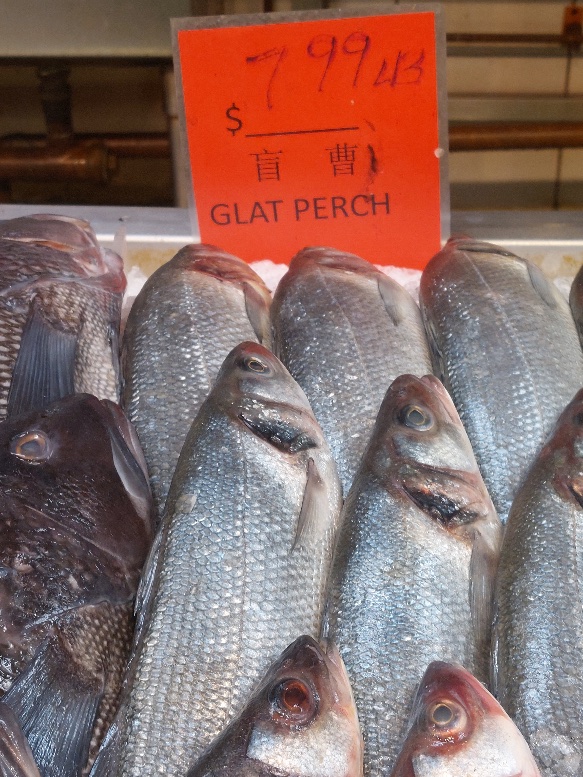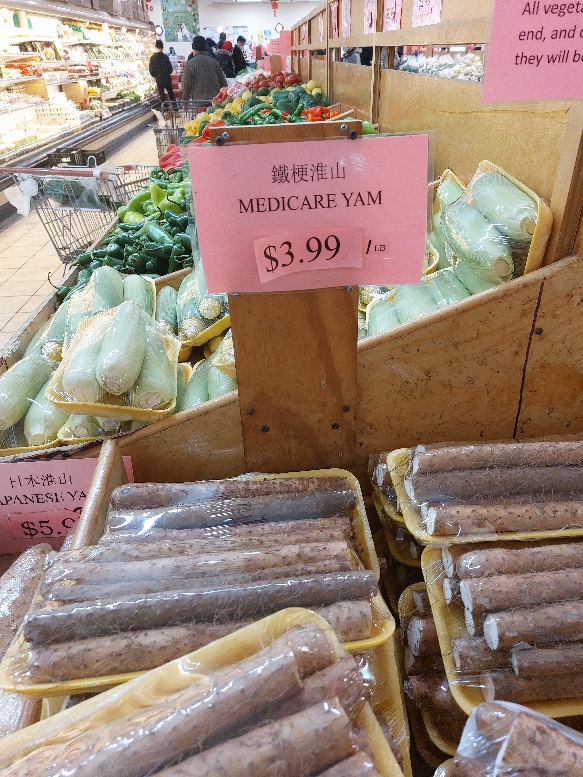Glat perch and medicare yam
« previous post | next post »
Glat perch
Label in a Chinese fish market:
The names for fish proliferate wildly by region and language.
The name on the sign is "máng cáo 盲曹" (lit., "blind" + a morpheme that is used in various bureaucratic and political senses [see here]), perhaps the transcription of a local or non-Sinitic name.
At first I thought maybe that "glat" was an error for "flat", because we do have in Chinese piānkǒu yú 偏口魚 (lit., "flat mouth fish; fish with a mouth that is inclined to the side", cf. biǎn 扁 ["flat"]), better known as bǐmùyú 比目魚 (lit., "fish with eyes next to each other"), which — in its fully developed form — does indeed have eyes next to each other and a flat shape, namely, the flounder (see the images here). But the fish in question, the GLAT PERCH in the photograph above, is neither flat nor a flounder, nor does it have its mouth elongated to the side, nor are its eyes located side by side instead of on opposite sides of the head, like most fish. So much for the theory that GLAT is an error for FLAT.
This fish is also called "jiānwěn lú 尖吻鲈" (lit., "pointed mouth bass"), "jīnmù lú 金目鲈" (lit., "golden eye perch"), etc.
The English names for it also abound: "silver / Asian sea perch, golden perch, white sea bass, big mouth bass", etc.
The barramundi (Lates calcarifer) or Asian sea bass, is a species of catadromous fish in the family Latidae of the order Perciformes. The species is widely distributed in the Indo-West Pacific, spanning the waters of the Middle East, South Asia, Southeast Asia, East Asia, and Oceania.
Barramundi is a loanword from an Australian Aboriginal language of the Rockhampton area in Queensland meaning "large-scaled river fish". Originally, the name barramundi referred to Scleropages leichardti and Scleropages jardinii.
However, the name was appropriated for marketing reasons during the 1980s, a decision that has aided in raising the profile of this fish significantly. L. calcarifer is broadly referred to as Asian seabass by the international scientific community, but is also known as Australian seabass.
(source)
Be that as it may, I'm fairly confident that the "glat" on the sign is an orthographic mistake for "giant", since "giant perch" is another name for this fish. GIANT || GLAT.
Medicare yam
In the produce section of a supermarket:
The Chinese name on the sign is "tiěgěng huáishān 鐵梗淮山" ("iron stem yam"). It is also known as "tiěgùn huáishān 鐵棍淮山" (lit., "iron rod / stick yam"). The real problem is how to get from "iron stem / stalk" to "medicare".
It all boils down to this: in some jurisdictions (parts of Australia, for example) certain types of yam (e.g., so-called "wild yam") are considered to be Traditional Chinese Medicinal substances. It's only a hop, skip, and a jump from approval of a TCM substance for medicinal purposes to Medicare. Voilà!
Selected readings
- "Japanesespanishmackerel" (11/13/13)
- "Goldensmell salt and milkfish balls" (6/29/15)
- "Chinese Buzzwords of the year 2019: plagiarism / stealing a shtick" (1/8/20) — this and the following three items discuss gěng 梗 ("shtick")
- "'Rondle it!'" (2/25/19)
- "Crosstalk about topolects" (12/16/19)
- "Epochal Shanghai drone quote: 'Control your soul’s desire for freedom.'" 95/8/22)
[Thanks to Victor Steinbok]


Gene Anderson said,
December 19, 2022 @ 2:36 pm
Wild yams used for medicine are sometimes called "mountain medicine" in Chinese. I suspect that influenced the "medicare" there.
John from Cincinnati said,
December 19, 2022 @ 4:25 pm
Glatt Kosher narrowly refers to beef with smooth lungs, but colloquially is used to convey the sense of "super Kosher". The perch are being offered for sale to observant Jewish households.
cameron said,
December 19, 2022 @ 5:43 pm
There used to be a bar in my neighborhood in New York City called Barramundi. One of the owners was Australian. I always thought that was a clever name for a bar
Martin Schwartz said,
December 19, 2022 @ 6:39 pm
I bemusedly thought of the same conclusion as John, but I owe to John the explanation of the original
smooth-lunged reference. I knew glat(t) kosher only as
'strictly kosher'. In the latter sense at least the Yiddish phrase
has been adopted.adapted into the Persian of Iranian Jews in the US as g(e)lāt kāšér, the latter word in accordance with
Iranian pronunciation of Hebrew. The word is frequent in
publications of Iranian Jews in Southern California, and well known to informants I asked.
John Swindle said,
December 19, 2022 @ 11:39 pm
Medicare yams seem to appear in an online Quizlet vocabulary list for English language learners. I say "seem to" because the site is hedged about with registration requirements that I chose not to follow.
Medicare isn't just an American (USA) thing. Australian or Canadian Medicare may have their own yams.
Chas Belov said,
December 20, 2022 @ 11:22 pm
I love that the Cantonese term for catfish literally translates as "pond louse".
Victor Mair said,
January 2, 2023 @ 2:18 pm
I finally tracked down the source of this photograph. It was taken at the 99 Asian Supermarket in Malden, Massachusetts.